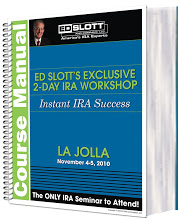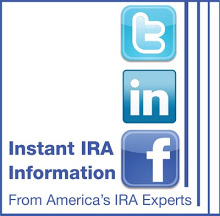It is another busy week at The Slott Report Mailbag with 3 consumer questions and our answers. As always, we stress the importance of working with a competent, educated financial advisor to keep your retirement nest egg safe and secure.
1.
Dear Ed and Company,
I bought your book, but haven't had time to read it yet. Here is our situation:
Our mom died in 1999 and our dad died in 2001. We 5 siblings inherited their IRAs. We were able to divide up their IRAs so that we each have inherited IRAs from both our Mom and Dad. Recently I've been reading that we needed to take distributions to our life expectancy. I've never taken a distribution because I wasn't aware of it. None of the brokerages that I've been with over the years has advised me to take a distribution. Is there some kind of exception because our parents died prior to the new changes? Should we be taking distributions now? I will be turning 59 1/2 in six months. Does that change anything?
Appreciate your help.
Thanks,
Cindy
Answer:
Yes you and your other siblings that inherited an IRA from your mother and father should be taking required minimum distributions (RMDs) each year. A year after the death of the parent you inherited the IRA from RMDs must be taken each year until the account balance is zero. There are no exceptions even if it was a Roth IRA. Your RMD is based on your single life expectancy (table found in IRS Publication 590) based on your age a year after the death of the IRA owner. The life expectancy factor is reduced each subsequent year by one. If the inherited IRAs were split into shares for each of the children prior to 12/31 of the year following the death of the IRA owner then each sibling would use their own age to determine their life expectancy.
If the account was NOT split prior to 12/31 all of the siblings must then use the shortest life expectancy of the oldest sibling. You must take RMDs for each year to avoid a 50% penalty. You can of course take more but not less than the RMD to avoid the penalty. Your current age younger or older than age 59 1/2 does NOT matter.
I would suggest you seek help from a knowledgeable advisor in determining the RMDs for each year you didn't take the RMD. The distribution rules changed in 2002. The advisor must know old rules and have old tables to correctly calculate the RMDs through 2001. Take the amount out as soon as you can and write a letter to the IRS asking them to waive the penalty because you did not know the rules and your advisor did not advise you to take RMDs. Form 5239 for each year there was a missed distribution must be submitted to IRS with the letter.
You still may have to pay the 50% penalty.
2.
My wife retired from a hospital and is vested in their 457b plan. We were told that she cannot do a rollover to an IRA. Is this by law?
Thank you,
Attilio Di Marco
Answer:
With the facts presented it is difficult to determine why they are saying her 457 plan cannot be rolled over to an IRA. It could be that the plan document does not provide for a lump sum distribution. Also, there are 2 types of 457 plans. Non-governmental plans generally are not eligible for rollover.
3.
Dear Ed,
Are you able to add multiple IRA accounts (with multiple trustees), and take a 72(t) distribution from only one of the accounts? I have a 50-year-old client who will rollover $662,000 from his pension into an IRA brokerage account. I would like to do the 72(t) calculation on the entire $662,000 (which comes to approximately $2,700/mo) and then transfer $500,000 to two different variable annuity companies, leaving $162,000 in the brokerage account. Once the $162,000 is depleted in (approx) 5 years, I would then continue the distributions from the 2 remaining carries.
My objective is to:
1)take 5 years of distributions from a fixed account, and invest the remaining $500,000 into variable annuities with living benefits guarantees, instead of immediately taking distributions on the entire $662,000 in a variable annuity.
2)Invest with 2 carries to diversify my holdings.
Thank you so much!
Answer:
In order to use the 72(t) exemption as you suggestion the entire amount must go into the IRA. The investments you make in the IRA will not prohibit you from doing the 72(t) payments. You will of course have to have liquidity to pay the annual payments. Administratively, I would do the transfers before taking the first 72(t) distribution. You must understand that ALL the accounts are part of the 72(t). No other contributions, rollovers or transfers can go into any of the accounts and no distributions, other than the 72(t) distributions, can be made from any of the accounts. The payments must be taken until the late of age 59 1/2 or five years.
By IRA Technical Consultant Marvin Rotenberg and Jared Trexler
------------------------------------------------------------------------------
Comment, Question, Discussion Topic on your mind? Click on the Blue Comment Link below and leave your thoughts then check back to see what other consumers and advisors think.
*Copyright 2010 Ed Slott and Company, LLC
Thursday, July 29, 2010
RMDs and the 72(t) Exemption Highlight Mailbag
Subscribe to:
Post Comments (Atom)
















1 comments:
457 Plan is an key role for all private sector employees.and there are lot of terms of this plan to be know by every one who comes into this plan.
Post a Comment